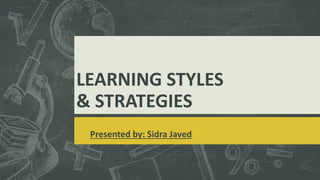
Learning style & strategies
- 1. LEARNING STYLES & STRATEGIES Presented by: Sidra Javed
- 2. OBJECTIVES/SEQUENCE OF PRESENTATION How do we learn Background of learning style and strategies Definition Learning style learning strategies Differences between style and strategy Importance of learning style and strategy
- 3. OBJECTIVES/SEQUENCE OF PRESENTATION Types of learning styles and strategies Teaching strategies Principles for teaching learning styles and strategies Important features of your own learning style and strategies ( questionnaire )
- 4. How do we learn? By Seeing (visual) By Hearing (auditory) By touching (tactile)
- 5. BACKGROUND ON LEARNING STYLES AND STRATEGIES The research bases on the work of twentieth century psychologist: Carl Jung (1976) and Jean Piaget (1968). In the last decade we have seen work specifically devoted to learning style and English Language teaching appear on the market-Reid (1995, 1997), Kinsella (1995), Oxford (1990), and Oxford and Anderson (1995).
- 6. WHAT ARE LEARNING STYLES AND STRATEGIES? Learning styles refer to “an individual’s natural habitual, and preferred ways of absorbing, processing, retaining new information and skills.” Where do learning styles come from? Why should teachers know about learning styles?
- 7. WHAT ARE LEARNING STYLES AND STRATEGIES? Teaching Strategies refer to “Characteristics we want to stimulate in students through different methodologies of teaching in an effective learning process, to enable them to become more proficient learners.”
- 8. IMPORTANCE OF LEARNING STYLE •Diverse learning communities •Determine what’s best for your students •Mismatch between instruction and learning styles: disastrous
- 9. LEARNING STYLE Type 1: Cognitive Styles
- 10. LEARNING STYLE Type 1: Cognitive Styles Field Dependent — learns best when information is presented in context. They are often more fluent language learners Field Independent — learns most effectively step-by-step and with sequential instruction. They are often more accurate language learners
- 11. LEARNING STYLE Type 1: Cognitive Styles Analytic — work more effectively alone and at his/her own pace Global — works more effectively in groups
- 12. LEARNING STYLE Type 1: Cognitive Styles Reflective — learns more effectively when they have time to consider new information before responding Impulsive — learns more effectively when they can respond to new information immediately; as language learners, they are risk takers
- 13. LEARNING STYLE Type 2: Sensory Styles
- 14. LEARNING STYLE Type 2: Sensory Styles Perceptual: Visual — learns best when there is visual reinforcement such as charts, pictures, graphs, etc.
- 15. LEARNING STYLE Type 2: Sensory Styles Perceptual: Auditory — learns more effectively by listening to information
- 16. LEARNING STYLE Type 2: Sensory Styles Perceptual: Tactile — learns more effectively when there is an opportunity to use manipulative resources
- 17. LEARNING STYLE Type 2: Sensory Styles Perceptual: Kinesthetic — learns more effectively when there is movement associated with learning
- 18. LEARNING STYLE Type 2: Sensory Styles Environmental: Physical — sensitive to learning environment, such as light, temperature, furniture Sociological — sensitive to relationships within the learning environment
- 19. LEARNING STYLE Type 3: Personality Styles Tolerance of Ambiguity: refers to how comfortable a learner is with uncertainty; some students dc4well in situations where there are several possible answers; others prefer one correct answer.
- 20. LEARNING STYLE Type 3: Personality Styles Right and Left Hemisphere Dominance: Left-brain dominant learners tend to be more visual, analytical, reflective, and self-reliant Right-brain dominant learners tend to be more auditory, global, impulsive, and interactive
- 21. TEACHING STRATEGY Metacognitive Strategy: Planning: Previewing main ideas, making plans to accomplish a task paying attention to key information seeking out and arranging for conditions to promote successful learning. Evaluating: Developing the ability to determine how well one has accomplished the task Monitoring: Self-checking ones comprehension
- 22. TEACHING STRATEGY Cognitive Strategy: Summarizing: Saying or writing the main idea Induction: Figuring out the rules from samples of language Imagery: Being able to visualize a picture and use it to learn new information Auditory Representation: Mentally replaying a word, phrase or piece of information Making Inference: Using information in the text to guess the meaning Using Inference: Developing the ability to use reference materials
- 23. TEACHING STRATEGY Cognitive Strategy: Grouping: Classifying words, terminology, quantities, or concepts Note-Taking: Writing down key word and concepts in verbal, graphic, or numerical form Elaboration of prior knowledge: Relating new to known information and making personal associations
- 24. TEACHING STRATEGY Social/Effective Strategy: Cooperating: Learning how to work with peers- completing a task, pooling information, solving problem, and obtaining feedback. Clarifying: Learning how to ask questions to get additional explanation or verification from the teacher or someone else who might know the answer Self-Talk: Reduce anxiety by talking positive to oneself
- 25. PRINCIPLES FOR TEACHING LEARNING STYLES AND STRATEGIES Vary activities and materials Make all learning styles value neutral Audit your teaching Encourage students to stretch their learning styles Find ways to link both learning styles and strategies
Hinweis der Redaktion
- At the end of the lecture, audience will be able to understand the following ........... And will be able to know what i am conducting this lecture for.....?
- jean piaget Piaget placed great importance on the education of children. As the Director of the International Bureau of Education, he declared in 1934 that "only education is capable of saving our societies from possible collapse, whether violent, or gradual. Carl jung was a Swiss psychiatristand psychotherapist who founded analytical psychology.[2] His work has been influential not only in psychiatry but also in philosophy,anthropology, archaeology, literature, and religious studies. He was a prolific writer. Do tell audience about the reid, kinsella anderson ....... What did they say ? What was their contribution and work.
